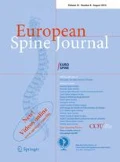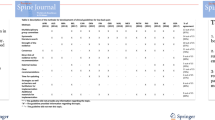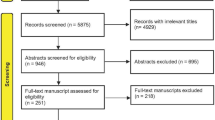Abstract
Purpose
Failed back surgery syndrome (FBSS) is a complex and multifaceted condition associated with significant disability and morbidity. The purpose of this study was to investigate the association between FBSS with new incidences of mental health disorders.
Methods
Our cohort included patients diagnosed with FBSS within 12 months of a posterior fusion, laminectomy, or discectomy, identified using The International Classification of Disease, both Ninth and Tenth Revisions (ICD-9 and ICD-10). In the next step, both non-FBSS and FBSS-diagnosed patients were queried for the diagnosis of first-time occurrence of mental health disorders. The incidence of new mental health disorders was determined within 12-months following FBSS diagnosis.
Results
FBSS patients were significantly at greater risk than non-FBSS patients of developing all included mental health pathologies: Depression: OR 1.9, 95% CI 1.8–2.0, p < 0.0001); Anxiety: OR 1.5, 95% CI 1.4–1.6, p < 0.0001; Sleep Disorder: OR 1.9, 95% CI 1.7–2.0, p < 0.0001; Bipolar Disorder: OR 1.7, 95% CI 1.5–2.0 p < 0.0001; PTSD: OR 1.5, 95% CI 1.3–1.8, p < 0.0001; Panic Disorder: OR 1.8, 95% CI 1.5–2.1, p < 0.0001; Suicidal Disorder: OR 1.7 95% CI 1.4–2.0, p < 0.0001, ADHD: OR 1.3, 95% CI 1.0–1.5, p = 0.0367.
Conclusions
In the current study, patients diagnosed with FBSS were at a significantly greater risk of developing mental health pathologies. While other studies have suggested pre-surgical psychological support and treatment, the current results suggest that a post-operative psychologic care may also be warranted. By identifying potential psychosocial unforeseen obstacles that occur in patients diagnosed with FBSS, more precise treatment pathways can be developed leading to improved patient outcomes.



Similar content being viewed by others
Availability of Data/Code
No patient identifiers were collected, as we used a publicly available nationally-representative database purchased through PearlDiver. No unique code was developed, and standard statistical software (RStudio) and tests were used.
References
Buchbinder R, Blyth FM, March LM, Brooks P, Woolf AD, Hoy DG (2013) Placing the global burden of low back pain in context. Best Pract Res Clin Rheumatol 27(5):575–589. https://doi.org/10.1016/j.berh.2013.10.007
Katz JN (2006) Lumbar disc disorders and low-back pain: socioeconomic factors and consequences. J Bone Joint Surg Am 88(Suppl 2):21–24. https://doi.org/10.2106/JBJS.E.01273
Martin BI, Mirza SK, Spina N, Spiker WR, Lawrence B, Brodke DS (2019) Trends in lumbar fusion procedure rates and associated hospital costs for degenerative spinal diseases in the United States, 2004 to 2015. Spine 44(5):369–376. https://doi.org/10.1097/BRS.0000000000002822
Thomson S (2013) Failed back surgery syndrome – definition, epidemiology and demographics. Br J Pain 7(1):56–59. https://doi.org/10.1177/2049463713479096
Follet K, Dirks B (1993) Etiology and evaluation of the failed back surgery syndrome. Neurosurg Q 3:40–59
Daniell JR, Osti OL (2018) Failed back surgery syndrome: a review article. Asian Spine J 12(2):372–379. https://doi.org/10.4184/asj.2018.12.2.372
Schofferman J, Reynolds J, Herzog R, Covington E, Dreyfuss P, O’Neill C (2003) Failed back surgery: etiology and diagnostic evaluation. Spine J 3(5):400–403. https://doi.org/10.1016/s1529-9430(03)00122-0
Baber Z, Erdek MA (2016) Failed back surgery syndrome: current perspectives. J Pain Res 9:979–987. https://doi.org/10.2147/JPR.S92776
Pinto A, Faiz O, Davis R et al (2016) Surgical complications and their impact on patients’ psychosocial well-being: a systematic review and meta-analysis. BMJ Open 6:e007224. https://doi.org/10.1136/bmjopen-2014-007224
Skolasky RL, Wegener ST, Maggard AM, Riley LH 3rd (2014) The impact of reduction of pain after lumbar spine surgery: the relationship between changes in pain and physical function and disability. Spine (Phila Pa 1976) 39(17):1426–1432. https://doi.org/10.1097/BRS.0000000000000428
Parai C, Hägg O, Lind B, Brisby H (2019) Follow-up of degenerative lumbar spine surgery-PROMs stabilize after 1 year: an equivalence study based on Swespine data. Eur Spine J 28(9):2187–2197. https://doi.org/10.1007/s00586-019-05989-0
Fekete TF, Loibl M, Jeszenszky D et al (2018) How does patient-rated outcome change over time following the surgical treatment of degenerative disorders of the thoracolumbar spine? Eur Spine J 27(3):700–708. https://doi.org/10.1007/s00586-017-5358-2
Trief PM, Grant W, Fredrickson B (2000) A prospective study of psychological predictors of lumbar surgery outcome. Spine (Phila Pa 1976) 25(20):2616–2621. https://doi.org/10.1097/00007632-200010150-00012
Sinikallio S, Aalto T, Airaksinen O, Lehto SM, Kröger H, Viinamäki H (2011) Depression is associated with a poorer outcome of lumbar spinal stenosis surgery: a two-year prospective follow-up study. Spine (Phila Pa 1976) 36(8):677–682. https://doi.org/10.1097/BRS.0b013e3181dcaf4a
Anderson JT, Haas AR, Percy R, Woods ST, Ahn UM, Ahn NU (2015) Clinical depression is a strong predictor of poor lumbar fusion outcomes among workers’ compensation subjects. Spine (Phila Pa 1976) 40(10):748–756. https://doi.org/10.1097/BRS.0000000000000863
Theologis AA, Ailon T, Scheer JK et al (2016) Impact of preoperative depression on 2-year clinical outcomes following adult spinal deformity surgery: the importance of risk stratification based on type of psychological distress. J Neurosurg Spine 25(4):477–485. https://doi.org/10.3171/2016.2.SPINE15980
Adogwa O, Parker SL, Shau DN et al (2012) Preoperative Zung Depression Scale predicts outcome after revision lumbar surgery for adjacent segment disease, recurrent stenosis, and pseudarthrosis. Spine J 12(3):179–185. https://doi.org/10.1016/j.spinee.2011.08.014
Li S, Qi M, Yuan W, Chen H (2015) The impact of the depression and anxiety on prognosis of cervical total disc replacement. Spine (Phila Pa 1976) 40(5):E266-271. https://doi.org/10.1097/BRS.0000000000000743
Linton SJ (2000) A review of psychological risk factors in back and neck pain. Spine (Phila Pa 1976) 25(9):1148–1156. https://doi.org/10.1097/00007632-200005010-00017
Jackson KL, Rumley J, Griffith M, Agochukwu U, DeVine J (2020) Correlating psychological comorbidities and outcomes after spine surgery. Global Spine J 10(7):929–939. https://doi.org/10.1177/2192568219886595
Lentz TA, Beneciuk JM, Bialosky JE et al (2016) Development of a yellow flag assessment tool for orthopaedic physical therapists: results from the optimal screening for prediction of referral and outcome (OSPRO) cohort. J Orthop Sports Phys Ther 46(5):327–343. https://doi.org/10.2519/jospt.2016.6487
Dedeogullari E, Paholpak P, Barkoh K et al (2017) Effect of mental health on post-operative infection rates following cervical spine fusion procedures. J Orthop. 14(4):501–506. https://doi.org/10.1016/j.jor.2017.08.006
Kamalapathy PN, Wang KY, Puvanesarajah V, Raad M, Hassanzadeh H (2021) Presence and severity of mental illness is associated with increased risk of postoperative emergency visits, readmission, and reoperation following outpatient ACDF: a national Database analysis [published online ahead of print, 2021 Jul 2]. Global Spine J. 21925682211026913. https://doi.org/10.1177/21925682211026913
GBD (2019) Mental Disorders Collaborators (2022) Global, regional, and national burden of 12 mental disorders in 204 countries and territories, 1990–2019: a systematic analysis for the global burden of disease study 2019. Lancet Psychiatry 9(2):137–150. https://doi.org/10.1016/S2215-0366(21)00395-3
Wahlman M, Häkkinen A, Dekker J, Marttinen I, Vihtonen K, Neva MH (2014) The prevalence of depressive symptoms before and after surgery and its association with disability in patients undergoing lumbar spinal fusion. Eur Spine J 23(1):129–134. https://doi.org/10.1007/s00586-013-2896-0
Polatin PB, Kinney RK, Gatchel RJ, Lillo E, Mayer TG (1993) Psychiatric illness and chronic low-back pain The mind and the spine–which goes first? Spine (Phila Pa 1976) 18(1):66–71. https://doi.org/10.1097/00007632-199301000-00011
Strøm J, Bjerrum MB, Nielsen CV et al (2018) Anxiety and depression in spine surgery-a systematic integrative review. Spine J 18(7):1272–1285. https://doi.org/10.1016/j.spinee.2018.03.017
Havakeshian S, Mannion AF (2013) Negative beliefs and psychological disturbance in spine surgery patients: a cause or consequence of a poor treatment outcome? [published correction appears in Eur Spine J. 2014 Feb;23(2):489]. Eur Spine J 22(12):2827–2835. https://doi.org/10.1007/s00586-013-2822-5
Bayoumi AB, Ikizgul O, Karaali CN, Bozkurt S, Konya D, Toktas ZO (2019) Antidepressants in spine surgery: a systematic review to determine benefits and risks. Asian Spine J. 13(6):1036–1046. https://doi.org/10.31616/asj.2018.0237
Funding
No sources of funding were used for this study.
Author information
Authors and Affiliations
Corresponding author
Ethics declarations
Conflict of interest
No conflict of interest. Disclosures outside of submitted work: JCW- Royalties – Zimmer Biomet, Seaspine, Depuy Synthes; Consulting: Precision OS (no money paid); Investments/Options – Bone Biologics, Pearldiver, Surgitech; Board of Directors—AO Foundation Board (honorarium), National Spine Health Foundation (non-financial, volunteer); Fellowship Funding (paid to institution): AO Foundation; Payment for expert testimony: various law firms. ZB- consultancy: Cerapedics (past), Research Support: SeaSpine (past, paid to the institution), Next Science (past, paid directly to institution), Medical Metrics (past, paid directly to institution), NIH SBIR grant (past, paid to institution); North American Spine Society: committee member; Lumbar Spine Society: Co-chair Educational Committee, AOSpine Knowledge Forum Degenerative: Associate member; AOSNA Research committee- committee member.
Additional information
Publisher's Note
Springer Nature remains neutral with regard to jurisdictional claims in published maps and institutional affiliations.
Rights and permissions
Springer Nature or its licensor holds exclusive rights to this article under a publishing agreement with the author(s) or other rightsholder(s); author self-archiving of the accepted manuscript version of this article is solely governed by the terms of such publishing agreement and applicable law.
About this article
Cite this article
Stanton, E., Fresquez, Z., Muehlbauer, E.J. et al. Onset of mental disorders in patients who developed failed back surgery syndrome. Eur Spine J 31, 2612–2618 (2022). https://doi.org/10.1007/s00586-022-07334-4
Received:
Revised:
Accepted:
Published:
Issue Date:
DOI: https://doi.org/10.1007/s00586-022-07334-4




